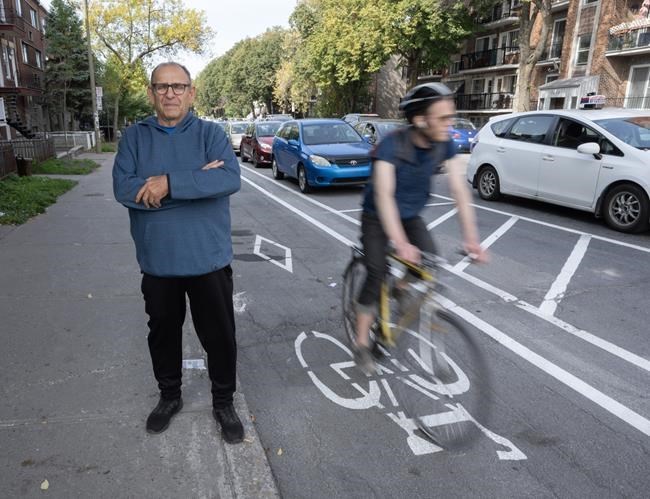MONTREAL — Xavier Richard says he was taking a stroll through his Montreal neighbourhood last week when he noticed a pedestrian hunched over in one of the area’s new bike lanes.
Richard approached to offer assistance. That’s when he saw the thumbtacks — more than 100 strewn across the path. He spent the next few minutes helping the stranger, who had stopped to pick them up.
"The climate is tense," Richard said of recent politics in the Park Extension neighbourhood, northwest of downtown. He said he doesn‚Äôt know how the thumbtacks got there, or who may have dropped them, but he suspects it was a deliberate act.¬Ý
"There's animosity that's particularly brought on by opponents of bikes or the bike path."
In bike-friendly Montreal, opposition to new cycling lanes in Park Extension and the nearby St-Michel neighbourhood has been notably fervent: groups of residents have organized protests, and police have reported instances of mischief, armed assault and obstruction of civil servants or peace officers at some of the demonstrations.
The Villeray—St-Michel—Parc-Extension borough is redesigning sections of multiple streets to install new, protected bike lanes. In Park Extension, that work includes the elimination of 250 on-street parking spaces. But some residents say the removal of parking in the dense neighbourhood will diminish their mobility.
Sia Spanoudakis is among those who say they have taken part in peaceful protests against the removal of parking. A former resident of Park Extension, she says she worries how the changes will affect her elderly parents who live in the neighbourhood and rely on their vehicle.
"No one is against secure bike paths," Spanoudakis said in a recent interview. "The point of contention is why does this need to be done with the removal of 250 parking spots, which (is) going to impact the quality of life in the neighbourhood?"
Spanoudakis distanced herself from the acts of vandalism targeting bike paths, but said the borough's plan to eliminate parking for bike paths has polarized the community. "We clearly feel that we are –°¿∂ ”∆µ pitted against the needs of the cyclists and it shouldn't be that."
Mario Di Chiaro, a Park Extension resident who has organized a handful of protests, said the city has been obstinate in the face of what he described as residents' reasonable concerns. The goal of the protests, he said, is to "marry" the needs of cyclists and drivers, but borough administrators "don't want to talk."
Di Chiaro, Spanoudakis and others, including 25-year Park Extension Coun. Mary Deros, accuse the borough of imposing the bike paths with little notice or consideration of residents' needs.
"I have never in 25 years seen such disregard for our citizens," Deros said in a recent interview. "Where are these people going to park?" she asked. "How are these people going to go to work? How are these people going to manage?"
The expansion of Montreal's cycling network ‚Äî which stretched more than 900 kilometres as of May 2023 ‚Äî has been a priority for Mayor Val√©rie Plante since she took office in 2017. Among her administration's signature achievements is the creation of the R√©seau express v√©lo, a 191-kilometre lattice of protected bike lanes through some of the city's densest neighbourhoods. In November, the city announced plans to create at least 200 kilometres of new protected bike lanes by the end of 2027.¬Ý
Proponents of the protected bike path plan challenge the notion that the elimination of parking spots will have a widespread negative impact on Park Extension.
Fifty per cent of households in the neighbourhood did not have a car as of 2018, according to the latest data from the Montreal-area transit authority, supplied by McGill University department of geography post-doctoral researcher Jérôme Laviolette.
"From an equity perspective, keeping parking spaces for car owners means we are depriving half the population (in) that neighbourhood from using that space," said Laviolette, who studies sustainable mobility.¬Ý
Jean-François Rheault, president of cycling advocacy group Vélo Québec, says protected bike lanes expand transportation options for all residents. "The biggest barrier for more people to be able to choose cycling as a mode of transportation is the lack of infrastructure," he said.
In a phone interview, borough Mayor Laurence Lavigne Lalonde, who is a member of Plante's political party, acknowledged the removal of parking spaces may inconvenience some drivers, but said the goal of the new bike lanes is to increase safe mobility options for all residents in a neighbourhood historically underserved by cycling infrastructure.
The mayor said people have a right to protest, but insisted the borough will move ahead with its bike path plans for Park Extension.
Opponents have vowed to continue to voice their dissent. A group of residents calling themselves the Coalition for Democracy Park Extension is raising funds for possible legal action against the city.
But Rheault expects opponents will come to realize the value of protected bike lanes. "I trust that … by next year people will realize the benefits that it brings to their mobility and to their neighbourhood and that people will be much happier."
This report by The Canadian Press was first published Oct. 3, 2023.
Thomas MacDonald, The Canadian Press



